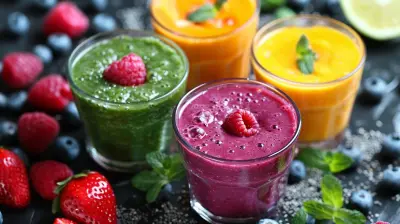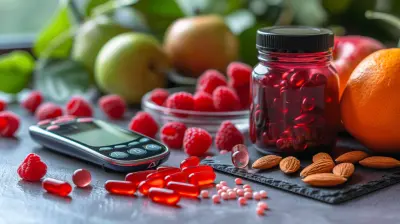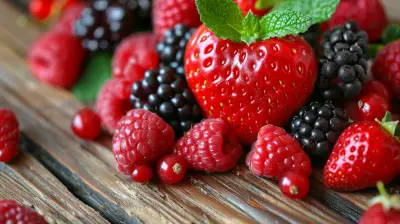Best Practices for Supporting Hormonal Health in Teens
7 April 2025
Hormones are the tiny messengers that dictate some of the most significant changes in a teen's life. From mood swings and acne to growth spurts and metabolism shifts, these chemical signals run the show. However, when they’re out of balance, things can get pretty rough—think fatigue, moodiness, irregular periods, and even long-term health complications.
So, how can we support teens and help them maintain hormonal balance? The good news is that small, everyday choices can make a big difference. Let's dive into the best practices for supporting hormonal health in teens.

1. Nourishing the Body With the Right Foods
You know the saying, “You are what you eat”? Well, it rings especially true for hormonal health. What teens put on their plates affects everything from energy levels to emotional well-being.Prioritize Healthy Fats
Hormones are made from fat, so it's crucial to include high-quality fats in a teen's diet. Avocados, nuts, seeds, olive oil, and fatty fish like salmon provide the essential omega-3s and monounsaturated fats needed to support hormone production.Balance Blood Sugar
Unstable blood sugar can wreak havoc on hormones. High-sugar, processed foods cause insulin spikes, which can lead to imbalances in other hormones like cortisol (the stress hormone) and estrogen. Encourage whole foods like fiber-rich veggies, whole grains, and lean proteins to keep blood sugar steady.Support the Gut
A healthy gut equals better hormone balance. Probiotic-rich foods like yogurt, kefir, and fermented vegetables help keep digestion smooth and support the microbiome, which plays a direct role in hormonal regulation.
2. Keeping Stress in Check
Teens today are under a mountain of stress—school, social media, friendships, family expectations, the list goes on. But chronic stress leads to high levels of cortisol, which can interfere with sleep, digestion, and even reproductive hormones.Encourage Relaxation Techniques
Introduce simple strategies like deep breathing, guided meditation, or even journaling. Something as small as a 10-minute mindfulness break can help manage stress levels and keep hormones in check.Get Moving
Exercise isn’t just for physical health—it’s a powerful tool for reducing stress and balancing hormones. Activities like yoga, dancing, walking, or playing a sport help regulate cortisol levels while also boosting feel-good hormones like serotonin and dopamine.Limit Screen Time
Scrolling through social media late at night or binge-watching shows may seem harmless, but excessive screen time—especially before bed—can mess with melatonin production, leading to poor sleep quality. Encourage screen-free wind-down routines to improve rest and balance hormones.
3. Prioritizing Sleep
Sleep might be the most underrated tool for hormone balance. Teens need around 8-10 hours of quality sleep per night, yet many fall short due to school demands, social obligations, or late-night phone use.Maintain a Regular Sleep Schedule
Going to bed and waking up at the same time every day (yes, even on weekends) helps regulate the body's internal clock, making hormone production more stable.Create a Sleep-Friendly Environment
A dark, cool, and quiet room helps with melatonin production, ensuring deep and restful sleep. Using blackout curtains, white noise machines, or even lavender essential oil can create a calming bedtime routine.
4. Staying Hydrated
Hydration is a game-changer when it comes to hormonal health. Every cell in the body—including those responsible for producing and regulating hormones—depends on water to function properly.Avoid Sugary and Caffeinated Drinks
While soda, energy drinks, and excessive coffee might seem tempting, they can mess with cortisol levels and blood sugar balance. Opting for water, herbal teas, or infused water with lemon or cucumber is a better choice.Drink Enough Water Daily
Teens should aim for at least 8-10 glasses of water per day, depending on activity levels and climate. Carrying a reusable water bottle makes it easy to stay hydrated throughout the day.5. Supporting Natural Detoxification
Our bodies are naturally designed to detox, but poor diet, lack of sleep, and environmental toxins can slow down the process. By supporting the liver—the body’s main detox organ—teens can help their bodies eliminate excess hormones and maintain balance.Eat Liver-Supporting Foods
Cruciferous veggies like broccoli, cauliflower, and Brussels sprouts, along with leafy greens, beets, and turmeric, support liver detoxification, keeping hormones in harmony.Reduce Toxins
Endocrine disruptors—found in plastics, personal care products, and even some cleaning supplies—can mimic or block natural hormones. Encourage the use of glass or stainless-steel water bottles, natural skincare products, and organic foods whenever possible.
6. Addressing Nutritional Deficiencies
Even with a healthy diet, some teens may still lack essential nutrients that support hormone balance. Consider checking for deficiencies in:- Magnesium: Helps with stress reduction, sleep, and mood stability. Found in leafy greens, nuts, and seeds.
- Vitamin D: Supports immune and reproductive health. Spending time in the sun or taking a supplement can help.
- Zinc: Crucial for skin health and hormone regulation. Found in pumpkin seeds, lentils, and shellfish.
- B Vitamins: Support energy levels and stress management. Found in whole grains, eggs, and lean meats.
7. Avoiding Hormone Disruptors in Food and Environment
Many hidden chemicals in today’s environment can interfere with hormone production, known as endocrine disruptors. These include BPA in plastics, pesticides in food, and chemicals in personal care products.Choose Organic When Possible
Organic produce and hormone-free meats reduce exposure to pesticides and artificial hormones that can throw off a teen’s natural balance.Switch to Natural Personal Care Products
Many conventional skincare, shampoo, and makeup products contain harmful chemicals like parabens and phthalates. Opt for brands that use natural, non-toxic ingredients whenever possible.
8. Encouraging Open Conversations About Hormonal Health
Many teens struggle with hormone-related concerns but feel too embarrassed to talk about them. Encouraging open and judgment-free conversations about mood swings, acne, menstrual health, and energy levels can help them feel supported.Normalize the Discussion
Let teens know that hormonal changes are a natural part of growing up, and there’s no shame in discussing them. Whether it's an irregular period, an acne flare-up, or unexplained fatigue, being open about these issues can make a huge difference in their confidence and well-being.Seek Professional Guidance When Needed
If a teen experiences severe hormonal imbalances—such as extreme fatigue, depression, heavy or irregular periods, or persistent acne—consider consulting a healthcare professional. A doctor, nutritionist, or holistic practitioner can help identify underlying issues and develop a personalized plan.Final Thoughts
Supporting hormonal health in teens isn’t about quick fixes—it’s about cultivating lasting habits that create balance from the inside out. By prioritizing nutrition, sleep, stress management, and reducing environmental toxins, we can empower teens to navigate this phase with more ease and confidence.So, whether it’s swapping out processed snacks for whole foods, drinking more water, or getting in some quality shut-eye, every small step counts. The key? Consistency. Over time, these habits will help teens build a strong foundation for lifelong hormonal balance and overall well-being.
all images in this post were generated using AI tools
Category:
Healthy HormonesAuthor:

Madeline Howard
Discussion
rate this article
6 comments
Gabriella McInnes
This article effectively emphasizes the importance of nutrition, exercise, and mental well-being in supporting hormonal health, highlighting a holistic approach crucial for teens' development.
May 14, 2025 at 2:31 PM

Madeline Howard
Thank you! I'm glad you found the article emphasizes the holistic approach to hormonal health in teens. It's crucial for their overall development.
Octavia Wright
Great tips! Supporting teens' hormonal health is essential for their well-being and overall development. Thank you!
April 30, 2025 at 4:45 AM

Madeline Howard
Thank you for your kind words! I'm glad you found the tips helpful for supporting teens' health.
Katalina Chapman
Supporting hormonal health in teens is like planting a garden—nurture it, and watch them grow stronger!
April 18, 2025 at 4:01 PM

Madeline Howard
Thank you! That's a beautiful analogy. Just like a garden, nurturing hormonal health in teens can lead to thriving growth and resilience.
Fern McGuffey
In the dance of youth, hormones sway, Guide their rhythm, come what may. Nurture with balance, love, and care, For vibrant health, let them be aware. Embrace the journey, through trials they’ll bloom, In harmony’s light, dispel the gloom.
April 17, 2025 at 4:58 PM

Madeline Howard
Thank you for your beautiful reflection! Emphasizing balance and care is essential for nurturing healthy hormonal development in teens.
Aleta Velez
Forget potions and spells! To support teen hormonal health, try balancing good snacks and goofy dance breaks. Because nothing says ‘harmony’ like a well-fed teen doing the cha-cha in the kitchen!
April 15, 2025 at 4:14 PM

Madeline Howard
Absolutely! Emphasizing nutritious snacks and fun activities like dance breaks can be a great way to support teen hormonal health and promote overall well-being!
Nym Alexander
Thank you for this informative article on supporting hormonal health in teens. Your practical tips and insights are invaluable for parents and caregivers navigating this critical phase of development. It’s essential that we prioritize hormonal health to promote overall well-being during these formative years. Appreciate your dedication to this important topic!
April 14, 2025 at 3:31 PM

Madeline Howard
Thank you for your kind words! I'm glad you found the article helpful—supporting hormonal health is indeed crucial during these years.




